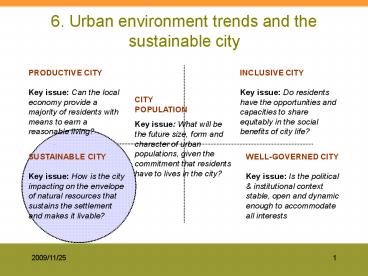6' Urban environment trends and the sustainable city PowerPoint PPT Presentation
1 / 9
Title: 6' Urban environment trends and the sustainable city
1
6. Urban environment trends and the sustainable
city
INCLUSIVE CITY Key issue Do residents have the
opportunities and capacities to share equitably
in the social benefits of city life?
PRODUCTIVE CITY Key issue Can the local economy
provide a majority of residents with means to
earn a reasonable living?
CITY POPULATION Key issue What will be the
future size, form and character of urban
populations, given the commitment that residents
have to lives in the city?
WELL-GOVERNED CITY Key issue Is the political
institutional context stable, open and dynamic
enough to accommodate all interests
SUSTAINABLE CITY Key issue How is the city
impacting on the envelope of natural resources
that sustains the settlement and makes it
livable?
2
6. Urban environment trends and the sustainable
city
- Population changes, economic growth and social
development all shape the built environment of
the city - In turn, size and shape of cities affects social
development, economic prospects and population
stability, because built environments impact on
the envelope of natural resources that makes
cities liveable. Cities may become so large,
dense, polluted and spatially dysfunctional that
they become unsustainable (diseconomies of scale
exceed benefits of locating in cities)
- Key issues examined in report
- Inefficiencies of apartheid spatial planning Air
and water quality, waste management,
- and long term land and water availability
- Environmental health and safety
- Urban mobility
3
6. Urban environment trends and the sustainable
city
- Urban apartheid design resulted in many built
environment inefficiencies - This means that the apartheid city had a high
impact on the envelope of natural resources
- On assumption of small populations, many SA
cities under-designed slums are the inevitable
result - Designed to marginalise, so large numbers pushed
far out into dormitory townships, and designed to
impede movement as measure of poliitcal control
high transport costs - Areas deliberately underserviced
4
6. Urban environment trends and the sustainable
city
- Post-apartheid developments have often
excacerbated the apartheid city form
- New housing developments on the edges of cities
because of subsidy structure and developer
preferences
- Dedensification especially movement out of
backyards. In 2001 there were still 544 667
backyard hsh in 9 cities - Office decentralisation, in part to escape
perceived crime and grime from inner cities being
occupied by new migrants and those moving out of
backyards
5
6. Urban environment trends and the sustainable
city
- Consequently, cities have a high and growing
impact on natural resource envelope - Valuable agriculatural land and water sources
being strained by the spreading out of cities
- NSDP notes that at least four SACN will face
major water deficits in the next 20 years - Part of the problem is utilisation of
transportation subsidies. If properly realocated
R2 billion annually could be made available for
better located land making for more compact
cities
6
6. Urban environment trends and the sustainable
city
- Some major challenges in adequately treating all
wastewater and managing domestic and business
waste
- In one city, illegal dumping per annum reached
266 139 tons, almost three quarters of
residential waste of 393 226 tons - 22 of households in the nine cities had
inadequate sanitation (VIP or less)
7
6. Urban environment trends and the sustainable
city
- Air pollution, and the health effects thereof,
are growing
- On average only 15 of the areas of the SACN are
monitored for air pollution - Measured tonnage of CO2 other gass emissions
range from 1 061 085 tons in one Gauteng city to
1 360 341 in another - One city reported that DEAT guidelines for
air-quality were exceeded 45 days during the year
(an air-pollution event)
8
6. Urban environment trends and the sustainable
city
- Increasing population densities and greater
traffic volumes on sometimes poorly maintained
roads means time costs of moving around cities
are inreasing - Exacerbated by poor availability and use of
public transport
9
6. Urban environment trends and the sustainable
city
- Many cities have begun to think and act
proactively on the urban environment. They have
new environmental protection by-laws,
environmental protection strategies, transport
plans, open space management systems - Some have alreade taken next steps to do
environmental footprint analyses. This
determines area equivalent to inputs needed to
sustain the city

